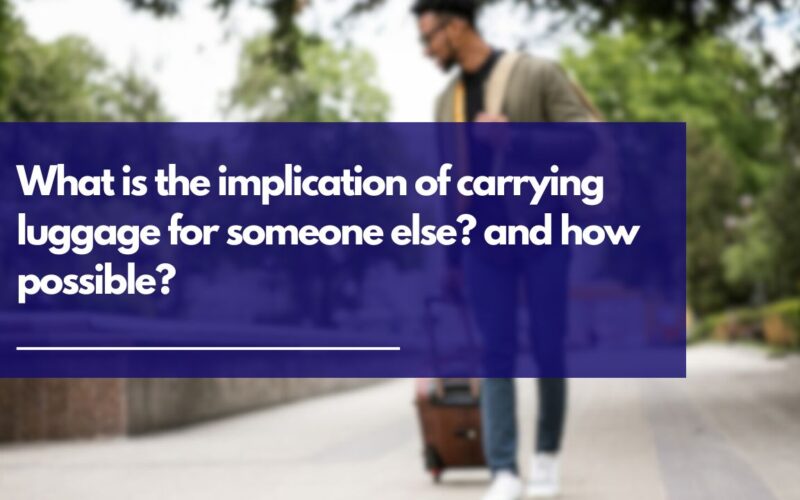As an Amazon Associate, I earn a small commission from qualifying purchases. Learn more about this.
Ever been on the receiving end of that question? Maybe a friend’s shopping spree went a little overboard, or perhaps they’re just bad at packing light.
Either way, the question of whether you can carry someone else’s luggage has probably cropped up many places.
Let’s break it down a bit.
Can you Carry Luggage for Someone Else?
Note: This article approaches “carrying someone’s luggage” from the standpoint of taking ownership of it through a trip. Otherwise, perhaps you looking forward to helping someone pick up their luggage refer to this article.
Technically, yes, you can. However, there are a lot of things to consider here.
Firstly, let’s talk about sheer logistics.
If you’ve got room in your suitcase or the physical strength to haul an extra bag, technically, there’s nothing stopping you. I mean, luggage is luggage, right?
It’s all about space and weight. If you’re flying, as long as you’re within the weight limit imposed by airlines and willing to possibly pay for an extra checked bag, it seems pretty straightforward.
However, there’s a little more to consider.
Think about this: when was the last time you lost something in your own bag?
Now imagine trying to keep track of not just your belongings, but someone else’s as well.
Take, for instance, you’re holding a friend’s phone or wallet for a few minutes. Suddenly, you’re hyper-aware of it, constantly checking to ensure it’s safe.
Carrying another person’s luggage might give you that same heightened sense of responsibility, but for the entirety of the trip.
Now, consider the process of checking in and security checks at the airport. Every bag goes through screening.
Even if you trust the person handing you their luggage, do you know exactly what’s inside? I’ve had moments where I forgot I had a water bottle in my bag, only to be reminded by airport security.
It’s an innocent mistake, but it can slow you down. Now think about managing such surprises, but with someone else’s belongings.
What is the implication of carrying luggage for someone else?
To start, we should definitely talk about trust.
When you agree to carry luggage for someone else, you’re essentially trusting them with a part of your journey.
You’re saying, “I believe you when you say that everything in this bag is okay.
And that’s a big deal. But trust is a two-way street.
They’re also trusting you with their possessions, hoping that their belongings will arrive safely at the destination.
You also want to keep in mind that when you take someone else’s luggage, you’re responsible for it.
That means if something goes wrong, like the luggage gets lost or items inside get damaged, it could be on you. Luggage theft is a thing.
And that’s a lot of responsibility to handle, especially if it’s a long trip with multiple layovers. It gets worse if the airport doesn’t have proper lockers, especially for layovers.
And we can’t talk about implications without mentioning security.
You know how you’re always asked if you’ve been in constant possession of your baggage or if anyone has given you something to carry? There’s a reason for that.
Security agencies across the world are on the lookout for illegal or prohibited items.
If you’re carrying a bag for someone else, you could unknowingly be transporting something prohibited.
If something suspicious is found, you’re the one who will have to answer for it. It doesn’t matter that it’s not your bag; you’re the one who brought it to the airport.
What’s a good practice or alternative to carrying luggage for someone else?
Okay, by now we’ve walked through the airport hallways together and covered the implications of carrying someone else’s luggage.
But let’s be honest, it does seem a tad risky.
But what if you genuinely want to help? Maybe it’s a close relative or a friend in dire need. How can you assist without landing in a potential quagmire?
1. Luggage Shipping Services:
If someone’s luggage is exceeding their allowance, or if they have extra items they need to send, consider suggesting a luggage shipping service.
Several companies specialize in this, and they ensure safe, timely delivery of bags from one place to another.
This way, the luggage never enters the airport ecosystem, and the owner retains full responsibility.
2. Pre-Travel Packing Session:
Offer to help your friend or relative with their packing before the journey.
This not only allows both of you to ensure that the luggage contains no prohibited items but also might help in efficiently packing to avoid excess baggage in the first place.
3. Double-Check Airline Policies:
Each airline has its baggage allowances and fees for extra luggage.
Before declining to help, it might be worth checking if purchasing additional allowance is a viable option. Sometimes, just paying a bit extra can save a lot of hassle.
4. Personal Items Split:
Most airlines allow one carry-on and one personal item.
If your friend’s issue is a few additional items, perhaps you can accommodate them in your personal item, like a handbag or backpack, provided you know exactly what they are.
This is a slightly safer approach than taking on a whole suitcase, as you have more control and awareness of the contents.
Conclusion
Carrying luggage for someone else is more than just an added weight on your journey. It’s a multifaceted decision with implications that span trust, accountability, security, and relationships.
It’s something that should be approached with a clear understanding of what you’re signing up for, open communication with the other person, and an awareness of the risks and benefits.







